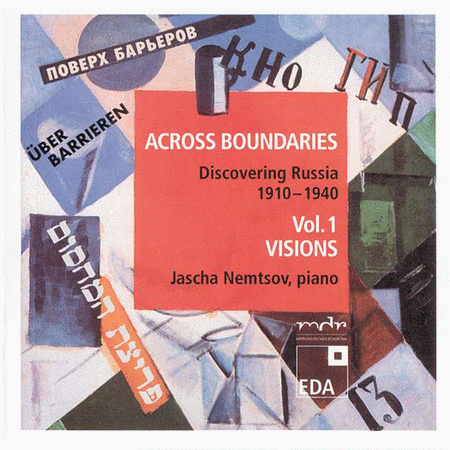Across Boundaries: Discovering Russia 1910 - 1940 Vol. 1
Visions
-
Ships in 4 to 6 weeks
Details
Description
SKU: M7.EDA-12
Visions. Composed by Alexander Weprik, Joseph Achron, and Lazare Saminsky. CD. Duration 70'. Eda records #EDA 12. Published by eda records (M7.EDA-12).The history of the 20th century was shaped to an extreme degree by ideological, political and racial barriers that hindered the arts from developing freely. Many artists were forced to emigrate, while others perished in death camps. Those who remained and survived were often cut off from the outside world, forced to adjust, or were silenced into submission. And this was by no means restricted to individual names: entire groups of artists and genres of art were eradicated and are no longer present in cultural life. With its series 'Across Boundaries - Discovering Russia 1910-1940,' eda records seeks to bridge one such a gap in music history. It presents world premiere recordings of works by Russian composers who were part of the generation of Prokofiev and Shostakovich, and who made major contributions to Russian music in the 1910s and 1920s. The reason why they were banished and suppressed: their Jewish ethnic background and refusal to accept the dictated 'socialist realism.' Grouped around Sergei Prokofiev's famous piano cycle Visions fugitives (1915-17), Vol. 1 presents first-ever recordings of character pieces by Joseph Achron, Arthur Lourié, Samuil Feinberg, Alexander Weprik, and Lazare Saminsky. Aside from Feinberg, they all emerged from the St. Petersburg Conservatory and, following Mussorgsky, represent a turn away from the late-romantic tradition à la Rachmaninoff and Scriabin. A stylistic arch spans from Arthur Lourié's enchanting 1917 cycle Piano Gosse to the rather bitter Statuettes by Joseph Achron from 1930. Vol. 1 of the series serves as an introduction of the representatives of this 'New Jewish School', while Volumes 2 and 3 explore their oeuvres in the context of their Jewish identity, persecution, and exile.
Song List (10)
- Arthur Lourie: Gigue (1927)
- Arthur Lourie: Valse (1926)
- Arthur Lourie: Marche (1927)
- Arthur Lourie: Toccata (1924)
- Samuil Feinberg: Berceuse (1932)
- Alexander Weprik: Dance (1927)
- Sergei Prokofiev: Visions fugitives (1915/17)
- Lazare Saminsky: Vision (1919)
- Joseph Achron: Statuettes (1930)
- Arthur Lourie: A Piano in the Children's Room (1917)

 Share
Share